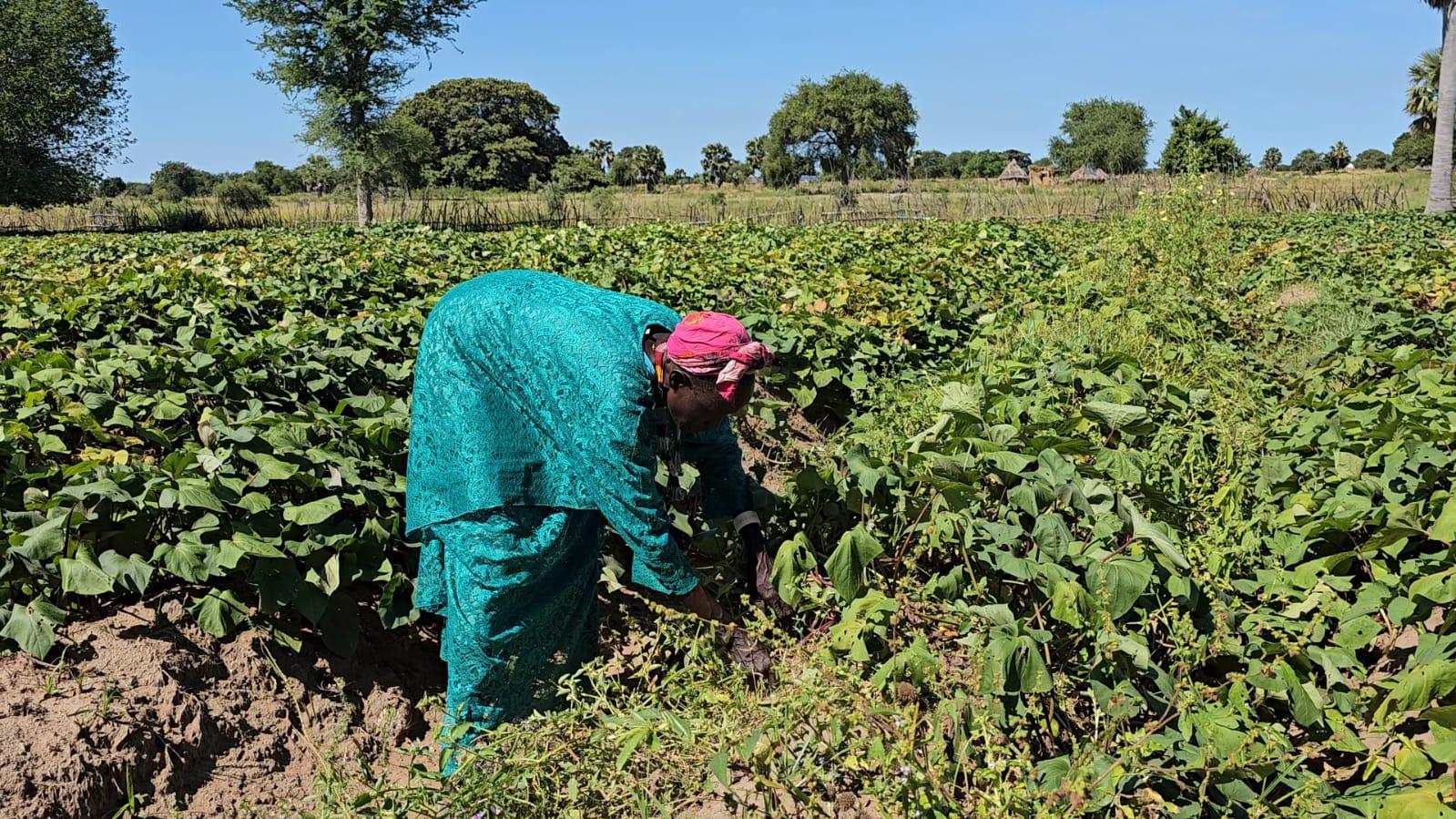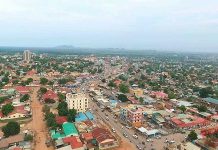Sheila Ponnie
Africa-Press – South-Sudan. In the remote villages of Twic County in South Sudan’s Warrap State, where the effects of the climate crisis have been devastating, sweet potatoes are bringing hope and transformation to the lives of thousands.
The City Review meets up with Ayok Koudok, a 41-year-old father of six children who has witnessed first-hand the incredible impact of sweet potatoes on his community.
For years, Ayok and his fellow villagers relied solely on sorghum as their main crop. However, frequent droughts and floods caused significant damage to their harvests, leading to widespread hunger and suffering. But everything changed when they embraced sweet potatoes.
“These sweet potatoes are helpful,” Ayok proudly says as he points at his fedan flourishing with a blooming sweet potato plant. He is just one of the more than 22,000 people in Ajong who have benefited from new knowledge and skills in sweet potato cultivation project supported by a donor.
Before the introduction of sweet potatoes, life was unbearable for Ayok and his community. The constant threat of hunger loomed large, and their resilience was tested repeatedly. Now, these resilient tubers have become a lifeline for them.
“The new crop varieties have transformed our lives,” Ayok explains with gratitude. “No longer do we fear droughts or floods destroying our crops. Sweet potatoes have given us stability and hope.”
The Sweet Potato Project aims to alleviate hunger in regions that are most vulnerable to the impacts of the climate crisis.
By diversifying agricultural practices and introducing climate-resilient crops like sweet potatoes, communities are better equipped to withstand the challenges brought about by changing weather patterns.
Also, Abuk Machuei Atem a 50-year-old Ajong Boma resident Wunrok Payam of Twic County, Warrap State sails on the same boat.
Atem, a mother of seven, and the other villagers claimed that for a long time, sorghum was their only source of income. But their crops suffered greatly from periodic droughts and floods, which resulted in widespread starvation and suffering. Nevertheless, when they accepted sweet potatoes, everything was different.
“Since the introduction of sweet potatoes in this village, my life have changed before the introducing, we did not know how to plant and produce this sweet potatoes and when we were taught how to produce them the whole villages life has changed from worse to the best,”
Atem says the sweet potatoes have enabled her to send her kids to school and take care of them in case they get sick.
“I am appreciative that I now know how to plant the crop and get some potatoes to the market so I may sell them and purchase other goods. I even prepare some of the potatoes for my kids when I bring them home.”
“I was astonished when I first learned about the new potato planting techniques. I used to wonder if potatoes had seeds like other crops; I had no idea that the potatoes actually come from the steam that may be planted,” Atem recalls.
“I cultivated the steam shortly after being introduced, but I had a lot of doubts. I waited three months before harvesting, and when we finally harvested the potatoes, I was overjoyed and couldn’t believe it.”
Atem found cooking difficult. “When I got home and cleaned the potatoes and made the fire, I poured a lot of water and I also put a lot of firewood because I thought the potatoes needed much fire so they got burnt but not all of them,” she says.
“When I initially tested this crop, the sweet potato made me drink three cups of water because it was so sweet. It was so soft, I felt like I was eating an egg. The first bite filled my mouth, and the second one did the same.”
Sweet potato garden in Ajong Boma
Isaac Amule, who heads the programme funded by the Foreign Commonwealth Development Office (FCDO) in Kwajock acknowledged that long droughts and floods were key drivers of food insecurity in the country.
“We decided to think of ways to mitigate the effects by Introducing crops that are resistant to floods and can do well in dry spaces.”
“Sweet potatoes are a new crop variety, and we are introducing them in the communities because they take a shorter time to grow and the yields are greater,” Amule explains.
“These people here go through several activities, they are trained and supported on how to prepare the land, do weeding and trained on post-harvest handling and how to manage pests using local means such as ashes and neem leaves which they mix and spread in their gardens.”
Sweet potatoes provide not just a reliable food source even in adverse conditions, but they also offer numerous health benefits. Packed with essential nutrients and vitamins, these tubers contribute to improved nutrition and overall well-being.
In addition to their nutritional value, sweet potatoes have become a source of income for Ayok and his fellow farmers. With the surplus harvest, they can sell their produce in local markets, generating much-needed revenue to support their families and invest in their community’s development.
Source: The City Review South Sudan
For More News And Analysis About South-Sudan Follow Africa-Press






